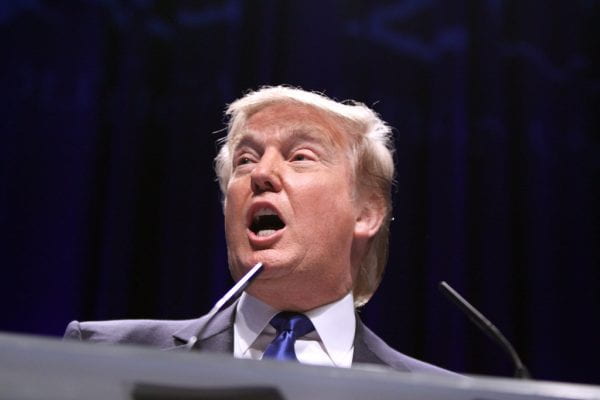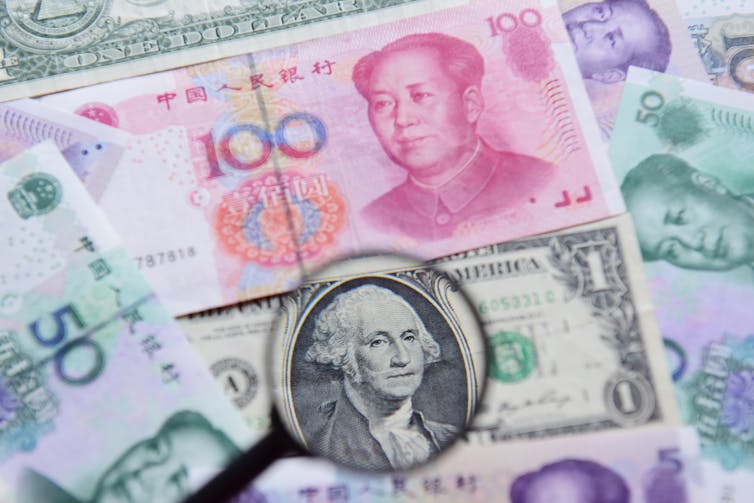
“Donald Trump”by Gage Skidmore is licensed under CC BY-SA 2.0
Winnie King, University of Bristol
The US has escalated its trade war with China by accusing the country of devaluing its currency to make its exports unfairly cheap. When China’s currency, the renminbi (RMB) fell below the symbolic seven-per-dollar level on August 5, President Donald Trump reacted by labelling China a currency manipulator on Twitter. His Treasury department followed suit, making it the official government position.
It is the latest development in a fight that was never purely about economics. And it marks a fundamental shift in relations between the world’s two largest economies. What was a relatively symbiotic economic relationship between the US and China is beginning to fracture – with serious implications for both countries, and the rest of the world.
China dropped the price of their currency to an almost a historic low. It’s called “currency manipulation.” Are you listening Federal Reserve? This is a major violation which will greatly weaken China over time!
— Donald J. Trump (@realDonaldTrump) 5 August 2019
The charge of currency manipulation has been thrown around by Trump since the early days of his 2015-16 presidential campaign. It is not, however, a classification that should be used lightly. Economic growth forecasts have worsened as a result and this kind of rhetoric makes matters worse.
What is currency manipulation?
Currency manipulation involves the artificial movement of a domestic currency valuation through government intervention such as by printing more money or buying and selling other currencies on the foreign exchange market.
Currency valuation is particularly important in the early stages of a country’s economic development. China is no exception. For instance, from the mid-1980s to late 1990s China kept its currency low to make its labour and production costs cheap. Managing its currency in this way proved a significant advantage for attracting foreign investment and enabled China to accumulate foreign exchange reserves. All of which are necessary for sustained growth.
But devaluing the currency also translates into more expensive imports for China’s domestic consumers, and a higher risk of foreign investors pulling their money out of the country. Plus, with China’s recent efforts to transform the RMB into an international reserve currency that is held by central banks around the world, foreign holders of the RMB expect a stable value. So manipulation can have real – and potentially destabilising – costs for China and its economy.
A year and a half into the US-China trade war, things are starting to take their toll for China. On July 15, the country reported a 6.2% growth rate, its slowest in 27 years. With record levels of debt and consumer inflation rates reaching a 15-month high, currency devaluation would in many ways exacerbate the situation. While China is known for state intervention, there’s no foul play here.

Junming Lu /shutterstock.com
To understand China’s currency regime, it is important to recognise that China prioritises stability. Its economic policy, and its approach to currency flows in particular, has been preoccupied with minimising volatility.
The drop in value of the RMB followed an announcement by the Trump administration that it was raising tariffs on US$300 billion of Chinese goods. This went against the consensus the two sides reached at the G20 in June and Chinese government officials say that the RMB devaluation came from the market reacting to this announcement, with escalating trade tensions putting the currency under pressure.
Similarly, in its annual assessment of China’s economy, published in the wake of US accusations, the IMF stuck with its position that the RMB is in line with China’s economic fundamentals. If anything, according to the IMF, the US dollar is overvalued.
Interdependence
America’s decision to label China a currency manipulator has significant implications for world markets. It not only exacerbates the uncertainty surrounding the state of relations between China and its largest trading partner, but as an escalation of tensions it is bad for both China’s and global economic growth.
Markets have been on edge since the US and China began putting tariffs on each other’s goods in July 2018. Immediately following the Treasury’s designation of China as a currency manipulator, volatility in the markets was seen around the world.
China is at the heart of the world’s global supply chain. Any economic slow down will extend to its major production and resource partners. Big American and multinational businesses have been hit by the uncertainty surrounding the costs of production, parts and components that come with an escalating trade war. Accusations of currency manipulation raise these tensions, further denting consumer confidence and their purchasing power around the world.
Plus, Trump’s approach to managing negotiations with China ignores the highly interdependent relationship of the two countries. One of the ways that China keeps the RMB from appreciating in value is by buying US debt with its large amount of US dollar reserves. This, in turn, enables China to keep producing and exporting cheap goods, which are bought by US consumers. Dubbed “Chimerica”, this situation has been a win-win for the two countries.
The Trump administration’s approach to China prioritises short-termism and immediate gain by appealing to the populist sentiment of his voter base over economic reality. By breaking the recent G20 accord and challenging the decisions of international institutions like the IMF, the US is ramping up the US-China trade war. And this cuts to the heart of how America’s global leadership is increasingly unreliable.
The rest of the world has long looked to the US and the institutions it spearheads (such as the IMF and World Bank) as a guide for global economic governance. So the accusation of currency manipulation not only raises genuine concerns for markets, but could help foster a global split along economic lines. If China gets cut off from US consumers it will be forced to turn elsewhere and, as the single largest holder of US debt, it has a serious weapon up its sleeve.![]()
Winnie King, Lecturer East Asian and International Political Economy, University of Bristol
This article is republished from The Conversation under a Creative Commons license. Read the original article.
